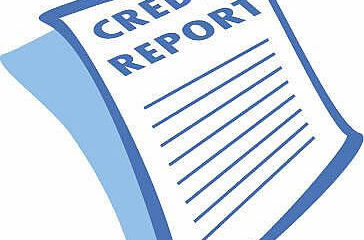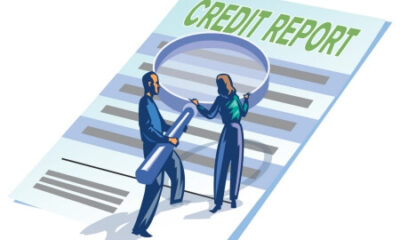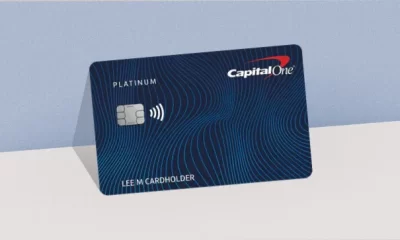Credit
5 Common Credit Report Errors and How to Fix Them

When it comes to your credit report, accuracy is everything. Even minor errors can lead to major headaches, from higher interest rates to denied loan applications. In this post, we’ll explore five common credit report errors and provide step-by-step instructions for correcting them.
Errors in Personal Information
One of the most common credit report errors is incorrect personal information. This can include misspellings of your name, incorrect addresses, or even the wrong social security number. While these errors may seem minor, they can still impact your credit score and your ability to obtain credit.
The first step in correcting errors in personal information is to contact the credit reporting agency. You can do this by phone, online, or by mail. Provide them with the correct information and any documentation that supports your claim. They should make the necessary corrections within 30 days.
Incorrect Account Information
Incorrect account information is another common credit report error. This can include accounts that don’t belong to you or accounts that have incorrect balances or payment histories. These errors can be particularly damaging, as they can impact your credit utilization and payment history.
If you notice an error in your account information, the first step is to contact the creditor directly. Explain the error and provide any documentation that supports your claim. They should update the information with the credit reporting agency on your behalf.
Duplicate Accounts
Duplicate accounts occur when the same account appears on your credit report multiple times. This can happen if the account was sold to another lender or if the creditor reported it multiple times in error. Duplicate accounts can impact your credit utilization and make it seem like you have more debt than you actually do.
To correct duplicate accounts, you’ll need to file a dispute with the credit reporting agency. Provide them with documentation that shows the account is a duplicate and request that they remove the extra listing. They should investigate the claim and make the necessary corrections.
Fraudulent Accounts
Fraudulent accounts are accounts that you didn’t open or authorize. These can be a sign of identity theft or fraud and can be particularly damaging to your credit report. The good news is that you are not responsible for these accounts and can have them removed from your credit report.
If you notice a fraudulent account on your credit report, the first step is to contact the creditor and report the fraud. They can place a fraud alert on your account and work with you to resolve the issue. You should also file a police report and contact the credit reporting agency to report the fraudulent account.
Incorrect Payment History
Finally, incorrect payment history is another common credit report error. This can include late payments that you didn’t make or payments that were reported as late when they weren’t. These errors can impact your credit score and your ability to obtain credit.
If you notice an error in your payment history, the first step is to contact the creditor directly. Explain the error and provide any documentation that supports your claim. They should update the information with the credit reporting agency on your behalf.
How to Identify Errors
Now that you know the common credit report errors, let’s talk about how to identify them. The first step is to request a free credit report from each of the three major credit reporting agencies (Equifax, Experian, and TransUnion). You can do this once a year for free.
Once you have your credit report, review it carefully. Note any discrepancies or errors that you see. This can include incorrect personal information, accounts that don’t belong to you, or incorrect payment histories.
How to Fix Errors
If you notice an error on your credit report, it’s important to act quickly to correct it. The first step is to contact the creditor directly and explain the error. If they are unable to correct the error on their own, you can file a dispute with the credit reporting agency.
Provide the credit reporting agency with documentation that supports your claim. This can include bank statements, credit card statements, or letters from the creditor. The agency should investigate the claim and make the necessary corrections within 30 days.
Tips for Maintaining a Clean Credit Report
Now that you know how to correct credit report errors, let’s talk about how to maintain a clean credit report. Regularly checking your credit report is the first step. Set a reminder to check your credit report at least once a year.
If you notice an error, report it promptly. The longer you wait, the harder it may be to correct the error. Finally, be vigilant about fraudulent activity. Keep your personal information safe and monitor your accounts regularly for signs of fraud.
Your credit report is an essential part of your financial health. Mistakes can be costly and impact your ability to obtain credit. By following the tips in this post, you can identify and correct credit report errors, ensuring that your credit report accurately reflects your credit history.
Credit
Bouncing Back: A Guide to Understanding and Recovering from Sudden Credit Score Drops

Experiencing a sudden decline in your credit score can be both startling and disconcerting. The number that financial institutions use to judge your creditworthiness can fluctuate for a myriad of reasons, many of which might not be immediately apparent. However, understanding the underpinnings of credit scores and the steps that can be taken to recuperate lost points is crucial. In this comprehensive guide, we delve into the common culprits behind these unexpected drops and map out a clear route to credit score recovery, empowering you to regain control of your financial health.
Unveiling the Mystery: Why Did My Credit Score Drop?
Before we explore recovery tactics, let’s first examine the potential triggers of a sudden decrease in your credit score:
- Inaccuracies on your credit report: Sometimes, the fault may lie with errors on your credit report. It’s not uncommon for credit reports to contain mistakes, ranging from incorrect personal information to misreported account statuses. Regularly reviewing your credit reports from the three major credit bureaus is essential.
- Missed or late payments: Your payment history is the most influential factor for most credit scoring models. Even a single payment that’s 30 days late can significantly impact your score.
- Increase in credit utilization: An uptick in your credit card balances can raise your credit utilization ratio, which might lead to a score decrease. Experts often recommend keeping this ratio under 30%.
- Recently opened credit accounts: Opening several credit accounts in a short period can result in a minor score dip due to the hard inquiries and the average age of your credit accounts being lowered.
- Closing old credit accounts: Conversely, closing your oldest accounts can shorten your credit history length and potentially lower your score.
Strategies for Credit Score Revival
Once you’ve pinpointed the cause of your credit score drop, you can implement several strategies to nurse it back to health:
- Dispute Credit Report ErrorsMistakes on a credit report can be disputed by contacting the credit bureaus directly or through the assistance of a consumer financial protection bureau. Timely correction of these inaccuracies can help restore your score.
- Focus on Payment PunctualityEnsure that all your bills are paid on time. Setting up automatic payments or calendar reminders can be effective ways to avoid missing due dates. Consistent, timely payments will gradually improve your score.
- Reduce Outstanding BalancesWork towards lowering the balances on your credit cards and loans. The FICO score model views lower credit utilization ratios favorably. Crafting a budget that prioritizes debt reduction can be beneficial for your score.
- Be Strategic About Credit ApplicationsLimit the number of new credit applications you submit. Each application can result in a hard inquiry, which can slightly damage your score. If you must apply for credit, try to do so sparingly.
- Maintain a Mix of CreditHaving a variety of credit types—from credit cards to auto loans—can be positive for your score, but only if managed responsibly. This demonstrates your ability to handle different kinds of financial obligations.
Prevention: The Best Medicine
Prevention is better than cure, and this adage holds especially true when it comes to credit scores. To prevent future drops, maintain good financial habits, monitor your credit report regularly, and adjust your spending behaviors to align with your credit goals. With a proactive approach, a sudden credit score drop will be nothing more than a temporary setback on your journey to financial success.
Remember, credit score recovery is a marathon, not a sprint. It requires patience, discipline, and a clear understanding of the factors that influence your score. By following the guidelines outlined in this post and leveraging resources from reputable sources, you’ll be well on your way to bouncing back from a credit score dip and forging a path to a robust financial future.
Credit
From Decent to Excellent: Proven Strategies to Elevate Your 640 Credit Score and Unlock Financial Freedom

A 640 credit score is seen as the gateway to fair credit territory—a launchpad for individuals striving to turn their financial narrative from good to great. While this score is certainly not the bottom of the credit spectrum, it doesn’t offer the benefits that higher scores provide. By employing strategic measures to improve your credit score, you are not just brushing up a number; you’re opening a world of financial opportunities that can lead to more favorable loan terms, lower interest rates, and a sense of security. In this post, we’ll explore actionable tips to help you elevate your credit score from decent to excellent, setting the stage for financial freedom and success.
Understanding the Importance of Your Credit Score
Your credit score is a critical financial parameter that lenders use to evaluate your creditworthiness. A 640 score signals to creditors that you’re on the cusp of transitioning to a higher credit tier. By enhancing your score, you can access better financial products and services, which can significantly impact your life. Let’s take a closer look at how you can make this transition.
Review Your Credit Reports Regularly
Errors on credit reports can drag down your score. It’s essential to check your credit reports from all three major credit bureaus—Equifax, Experian, and TransUnion—regularly and dispute any inaccuracies you find. This seemingly small step can have a big impact on your credit score.
Reduce Your Credit Utilization Ratio
High credit utilization can significantly lower your score. Financial experts recommend keeping your credit utilization ratio below 30%. This means if you have a credit limit of $10,000 across all cards, you should strive to owe less than $3,000 at any given time.
Strategic Actions to Boost Your Score
Elevating your credit score requires a combination of tactics and sustained effort. The following strategies are designed to help you responsibly manage credit and showcase your reliability to lenders:
- Pay Your Bills on Time: Your payment history is the single most significant factor affecting your credit score. Set up reminders or automate your payments to ensure that you never miss a due date.
- Avoid Taking on More Debt: While it might be tempting to open a new credit account to improve your credit mix, it’s essential to avoid incurring more debt until your score has improved.
- Increase Your Credit Limits: If you have a good payment history, you may be able to negotiate higher credit limits on your existing accounts, which can help lower your overall credit utilization.
Consider a Mix of Credit
Having different types of credit—such as credit cards, retail accounts, installment loans, finance company accounts, and mortgage loans—can benefit your score. However, it’s not wise to take out a loan you don’t need just to improve your credit mix.
Become an Authorized User
Becoming an authorized user on a family member or friend’s credit card can be a quick way to boost your score, as long as the primary cardholder has a strong payment history and keeps low balances.
Maintaining and Monitoring Your Progress
Improving your credit score is an ongoing process. You must be diligent about maintaining good credit habits and monitoring your credit score regularly. Patience is key—the results of your efforts will materialize over time as your credit history grows and your score begins to reflect your creditworthiness accurately. Embrace the journey towards financial freedom with confidence, knowing that each step you take is a move towards better financial opportunities.
By following the strategies outlined in this post and making informed decisions, you can transform a 640 credit score into a stellar financial reputation. Remember, each positive action contributes to a brighter financial future. Start today, and watch your credit score—and your financial opportunities—soar.
Credit
Is the The U.S. Bank Altitude® Connect Visa Signature® Card Hard to Get? What Are the Benefits?
The U.S. Bank Altitude® Connect Visa Signature® Card is a compelling option for those who travel frequently or spend a lot on gas. It offers a range of benefits and rewards that cater to various spending habits, especially in categories like travel, gas stations, and streaming services.
One of the standout features of this card is its reward structure. It offers 5X points on prepaid hotels and car rentals booked directly in the Altitude Rewards Center. Additionally, cardholders earn 4X points on travel at gas stations and EV charging stations, making it an excellent choice for road trips. For everyday spending, the card provides 2X points at grocery stores, grocery delivery, dining, and on eligible streaming services, with 1X point on all other eligible purchases.
The card also comes with a lucrative sign-up bonus. New cardholders can earn 50,000 bonus points after spending $2,000 within the first 120 days of account opening. This bonus is equivalent to a $500 value redeemable towards travel, gift cards, cash back, merchandise, and more. Notably, points earned on the Altitude Connect Card do not expire, adding to its long-term value.
Other significant benefits include a $30 credit for annual streaming service purchases like Netflix, Hulu, Spotify®, and Apple Music. Additionally, the card offers up to $100 in statement credits for TSA PreCheck® or Global Entry® application fees every four years. For frequent flyers, the complimentary Priority Pass™ Select membership provides access to over 1,300 VIP airport lounges worldwide, enhancing the travel experience.
The U.S. Bank Altitude® Connect Visa Signature® Card is generally targeted towards individuals with good to excellent credit scores. This implies that applicants should have a well-established credit history and a high credit score to increase their chances of approval. The card has an annual fee of $95 after the first year, which is waived initially. However, it does not have foreign transaction fees, making it more appealing for international purchases.
In terms of APR, the card has a variable APR ranging from 21.24% to 29.24%. Like most credit cards, it’s important to consider this aspect, especially if you plan to carry a balance on the card. The card also offers a Pay over Time feature with U.S. Bank ExtendPay™ Plan, allowing cardholders to split eligible purchases into equal monthly payments.
Overall, the U.S. Bank Altitude® Connect Visa Signature® Card is a strong contender in the category of travel and gas rewards credit cards. Its combination of high reward rates, travel perks, and streaming service credits make it a valuable card for those who spend heavily in these areas. However, potential applicants should weigh the annual fee and credit requirements against the benefits to determine if it aligns with their financial habits and goals.
-

 Business2 years ago
Business2 years agoHow To Check Your Business Credit Score
-

 Credit2 years ago
Credit2 years agoBetter Cash Installment Loan Offer Review
-

 Credit2 years ago
Credit2 years ago7 Tips for Managing Your Finances in Your 20s
-

 Family2 years ago
Family2 years agoThe Importance of Saving Money on Baby Products
-
Credit2 years ago
Best Cash Back Credit Cards of 2023: The Ultimate Guide
-

 Credit2 years ago
Credit2 years agoWhat Is The Impact of Student Loan Debt on Your Credit Score?
-
Credit1 year ago
Bouncing Back: A Guide to Understanding and Recovering from Sudden Credit Score Drops
-

 Credit2 years ago
Credit2 years agoUnlocking Potential: The Capital One Credit Increase Hack
